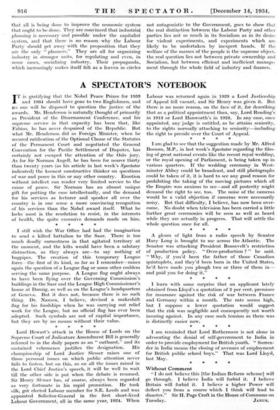Lord Hewart's attack in the House of Lords on the
Supreme Court of Judicature Amendment Bill is generally referred to in the daily papers as an " outburst," and its sustained vehemence justifies the designation. His championship of Lord Justice Slesser raises one of those personal issues on which public attention never fails to fasten, but on this, as on all the issues raised in the Lord Chief Justice's speech, it will be well to wait till the other side is put when the debate is resumed. Sir Henry Slesser has, of course, always been regarded as very fortunate in his rapid promotion. He took silk, got elected Labour member for S.E. Leeds and was appointed Solicitor-General in the first short-lived Labour Government, all in the same year, 1924. When Labour was returned again in 1929 a Lord , Justiceship of Appeal fell vacant, and Sir Henry was given it. But there is no more reason, on the face of it, for describing that as a political appointment than, say, Lord Reading's' in 1913 or Lord Hanworth's in 1923. In any case, once appointed, any judge is entitled, as he attains seniority, to the rights normally attaching to seniority—including the right to preside over the Court of Appeal. • * , *







































 Previous page
Previous page